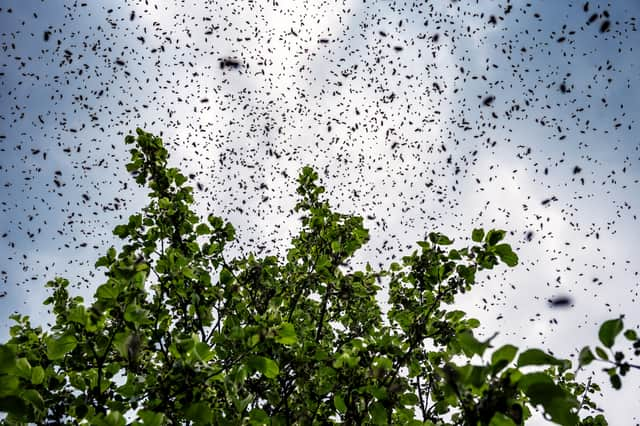UK set to be invaded by super-pest insects and rats due to coming heatwave


The UK is bracing itself for a heatwave, with temperatures to soar into the early 30s in the coming weeks.
This presents the perfect environment for insects and vermin to thrive, and the country could be invaded with a plague-like a swarm of wasps, moths and rats.
What pests can be expected?
Advertisement
Hide AdAdvertisement
Hide AdSpeaking to The Sun, Natalie Bungay, a technical officer for the British Pest Control Association (BPCA) said: “With all insects, they really thrive in balmy, warm, hot water, that it how their metabolism works.
“There will always be more of them in warmer temperatures - it’s going to bring more insects, flies, wasps and bees.”
As well as an increase in bugs, homeowners and gardeners are being warned about rats.
“We’re seeing more than normal call outs for rodents, and specifically rats,” Ms Bungay said.
Advertisement
Hide AdAdvertisement
Hide AdShe continued: “It’s possibly the warm weather and there is more fruit on the ground so they aren’t going as far for food and staying close to where they stayed during the winter.”
“Super-pests”
The Agriculture and Horticulture Development Board (AHDB) has reported that there’s been a huge influx in sightings of diamondback moths.
“Using data from Twitter, the influx spotted this week appears to be 10 times larger than the numbers seen earlier this season, when they first appeared on British shores in May,” the AHDB said.
Dr. Dawn Teverson, AHDB Knowledge Exchange Manager, said: “The moths are a migratory pest, so we monitor activity in Europe to predict when they may arrive in the UK.”
Advertisement
Hide AdAdvertisement
Hide Ad“Social media is a useful tool to help us give growers advance warning that they need to manage their crops for this potentially damaging pest.”
The AHDB says that the moths are often described as a “super-pest” due to the fact that they have a rapid lifecycle and have been found to be resistant to some insecticides.
Senior scientist at Rothamsted Research, Dr Steve Foster described the plague of moths as a “Viking invasion”.
Dr Foster said: “If we have warm weather favourable for mating of the moths, we could well be looking at another biblical plague of these moths that will take out brassica crops like in 2016.”
How to protect your home
Advertisement
Hide AdAdvertisement
Hide AdTo tackle the potential rat problem, Bungay said: “Make sure your food waste is taken care of or else they will get into it and make sure you get rid of any waste wood you may not have gotten around to yet because rats can live amongst it.”
Head of technical training academy at Rentokil Pest Control, David Cross, said: “Rodents need food and shelter to breed, so if you can take steps to deny them of these then you will drastically reduced their presence in the garden and the chances of them entering your home.”
Regarding creepy crawlies, Bungay said: “If you have actually got a nest in your garden or compost heap or rafters of your house, then you can have that treated.”
“We recommend calling in professional pest controllers because they have the right equipment - we advise against DIY jobs as they can get pretty angry and there is a risk of getting stung.”
This article originally appeared on our sister site Edinburgh Evening News